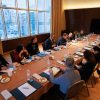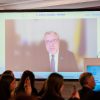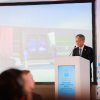Alyona Getmanchuk’s blog on Ukrainska Pravda.
Ursula and her 3D effect
One can even hardly dream up this for a book script. So painfully symbolic everything is! On the one hand, the “united Europe” will be headed by the descendant of the baron Ludwig Knoop, a famous entrepreneur known for his active trade with the Russian Empire. On the other hand, she is the daughter of one of the first European officials, who in the 1950s began the very “unification of Europe”. She herself is the ardent Euroatlantist understanding the importance of the allied relationship between Europe and the United States. All the aforementioned is about Ursula von der Leyen, the new head of the European Commission. To some extent, her family story reflects the EU approaches. Firstly, European states are interested in trade with Russia. Secondly, the ”united Europe” still respects its values. Thirdly, though disrupted relations between Europe and the EU are still strong.
Ursula von der Leyen, head of the European Commission, is not the worst option for Ukraine. Given the role that German representatives in the EU played in recent years (both in Berlin and Brussels), Ukraine has already fairly learned how to work with the “German EU” at various levels. The main thing now is not to lose valuable staff with respective expertise.
Secondly, von der Leyen is among the politicians understanding pretty well who is an aggressor and who is a victim in the Russian-Ukrainian war. She is one of the few federal Government members who labeled Russia’s actions as aggression publicly. Her understanding is crucial, taking into account that many politicians, who are coming to power in the EU these days, have not witnessed the beginning of Russian aggression and its most bloody stages.
Some might wonder how to assess her statements about the need for a dialogue with Russia. It is important to note that like many other German politicians, von der Leyen has undergone an important stage in reassessing her attitude towards Putin and the Russian Federation. Yet, it did not happen overnight. At first, there were more attempts to come to dialogue and understanding, then came up the understanding that it is better to speak from a position of strength. That is, when considering the position of Germany and its EU and NATO allies based on 3D principle (defense, deterrence, dialogue), Ursula von der Leyen definitely belongs to the group of politicians, who originally emphasized the importance of dialogue and then leaned towards deterrence and defense. In her case, this evolution embodied in the consent to deploy the German troops in Lithuania on a rotating basis. Ukraine has to be careful with those, who transformed 3D into 1D (solely dialogue). Advocates of the dialogue state that Russia is not a major power to deter and defend from. In addition, it is also important to understand that in the interpretation of many of our Western partners dialogue does not necessarily mean agreement, as many in Ukraine believe. It also implies discussion and debate.
Another question is how we assess the level of foreign politicians loyalty to Ukraine. Is it still based on the principle that “the one most anti-Putin is the most pro-Ukrainian”? In this context may we consider Jean Claude Juncker, who has recently become strongly favored by many Ukrainians, as a pro-Ukrainian politician? President Zerenskyy even called Mr. Junker “a cool guy”. However, last summer the President of the European Commission called for an end to “Russia-bashing”.
Thirdly, among today’s EU top officials Ursula von der Leyen is a rare example of a politician not concealing her positive attitude towards the idea of the EU enlargement. This especially discords with the moods of the “great European” Macron, who my French colleagues consider the most enlargement-skeptical French president of all times.
Fourthly, the EU policy is a continuation of the national policies of the member states. The election of Ursula von der Leyen once again confirms that it is important to systematically work not only with the EU leaders, but also with other top politicians in the member states, in order to have people understanding Ukraine at the helm of the EU. Even in European countries despite coming to power of new faces, the same politicians are quite often migrating from one important position to another both on national and European levels. At the same time, one should remember that Brussels impacts the politicians attitudes, sometimes turning them into more favorable to Ukraine. Donald Tusk is hardly to be called the most pro-Ukrainian high-ranking Polish official, but he clearly became the most pro-Ukrainian President of the European Council (he even called himself a “pro-Ukrainian maniac”).
Indeed, there can still be told a lot about Ursula’s transatlantic attitudes and her “Europeanized” position on the North Stream-2. Yet, more importantly, Ukraine’s dialogue with new EU leadership will be effective if Ukrainian leaders can develop a clear vision of European Ukraine, at least during the presidential term of Zelenskyy. Without promises of membership, but with a clear benchmark for both Ukrainian society and EU partners, the president has to convey his vision of how Ukraine should progress in five years’ period, in comparison to other European countries.
A suggestion that Ukraine should become a kind of a “new Poland” in the EU is outdated and unrealistic. The promise to join the EU in five years made by some Ukrainian politicians is irrelevant as well. Ukraine as the European Belarus is also not an option.







